常见不及物动词搭配(2018年9月27日10页)
常见不及物动词搭配2016
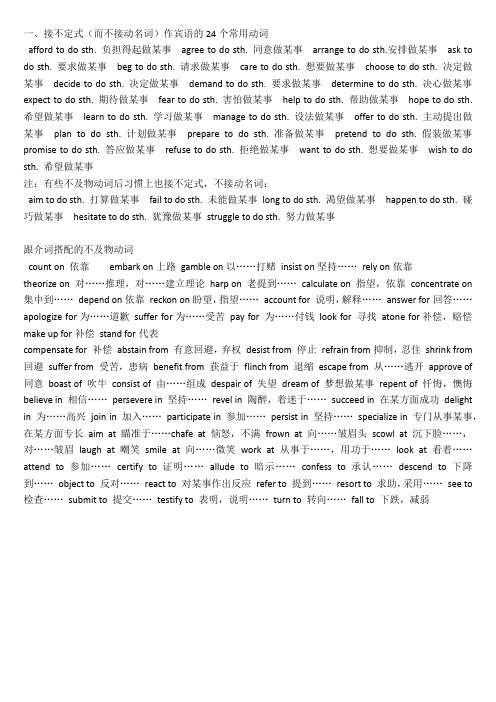
一、接不定式(而不接动名词)作宾语的24个常用动词afford to do sth. 负担得起做某事agree to do sth. 同意做某事arrange to do sth.安排做某事ask to do sth. 要求做某事beg to do sth. 请求做某事care to do sth. 想要做某事choose to do sth. 决定做某事decide to do sth. 决定做某事demand to do sth. 要求做某事determine to do sth. 决心做某事expect to do sth. 期待做某事fear to do sth. 害怕做某事help to do sth. 帮助做某事hope to do sth. 希望做某事learn to do sth. 学习做某事manage to do sth. 设法做某事offer to do sth. 主动提出做某事plan to do sth. 计划做某事prepare to do sth. 准备做某事pretend to do sth. 假装做某事promise to do sth. 答应做某事refuse to do sth. 拒绝做某事want to do sth. 想要做某事wish to do sth. 希望做某事注:有些不及物动词后习惯上也接不定式,不接动名词:aim to do sth. 打算做某事fail to do sth. 未能做某事long to do sth. 渴望做某事happen to do sth. 碰巧做某事hesitate to do sth. 犹豫做某事struggle to do sth. 努力做某事跟介词搭配的不及物动词count on 依靠embark on上路gamble on以……打赌insist on坚持……rely on依靠theorize on 对……推理,对……建立理论harp on 老提到……calculate on 指望,依靠concentrate on 集中到……depend on依靠reckon on盼望,指望……account for 说明,解释……answer for回答……apologize for为……道歉suffer for为……受苦pay for 为……付钱look for 寻找atone for补偿,赔偿make up for补偿stand for代表compensate for 补偿abstain from 有意回避,弃权desist from 停止refrain from抑制,忍住shrink from 回避suffer from 受苦,患病benefit from 获益于flinch from 退缩escape from 从……逃开approve of 同意boast of 吹牛consist of 由……组成despair of 失望dream of 梦想做某事repent of 忏悔,懊悔believe in 相信……persevere in 坚持……revel in 陶醉,着迷于……succeed in 在某方面成功delight in 为……高兴join in 加入……participate in 参加……persist in 坚持……specialize in 专门从事某事,在某方面专长aim at 瞄准于……chafe at 恼怒,不满frown at 向……皱眉头scowl at 沉下脸……,对……皱眉laugh at 嘲笑smile at向……微笑work at 从事于……,用功于……look at 看着……attend to 参加……certify to 证明……allude to 暗示……confess to 承认……descend to 下降到……object to 反对……react to 对某事作出反应refer to 提到……resort to 求助,采用……see to 检查……submit to 提交……testify to 表明,说明……turn to 转向……fall to 下跌,减弱在英语错误中,“及物动词+介词+宾语”(transitive verb+preposition+object),是常见的一种。
常见不及物动词归纳
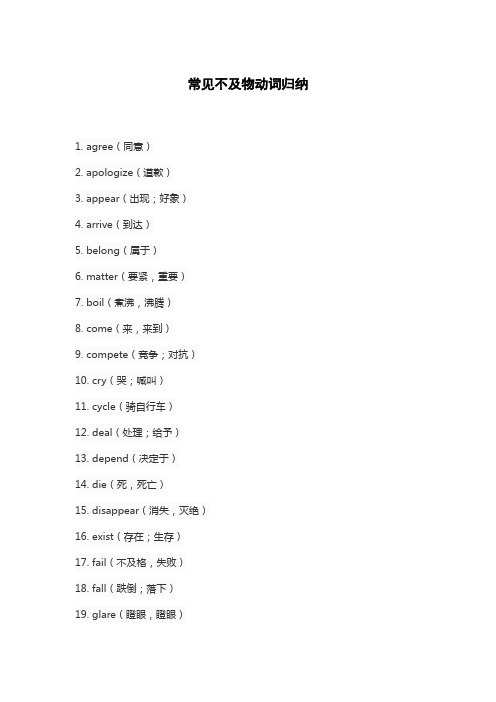
常见不及物动词归纳1. agree(同意)2. apologize(道歉)3. appear(出现;好象)4. arrive(到达)5. belong(属于)6. matter(要紧,重要)7. boil(煮沸,沸腾)8. come(来,来到)9. compete(竞争;对抗)10. cry(哭;喊叫)11. cycle(骑自行车)12. deal(处理;给予)13. depend(决定于)14. die(死,死亡)15. disappear(消失,灭绝)16. exist(存在;生存)17. fail(不及格,失败)18. fall(跌倒;落下)19. glare(瞪眼,瞪眼)20. go(去,走)21. graduate(毕业)22. happen(发生,出现)23. hesitate(踌躇,犹豫)24. hurry(匆忙)25. laugh(笑,大笑)26. lie(躺,平躺)27. listen(注意地听)28. live(居住,生活)29. look(看)30. move(搬家;移动)31. object(反对)32. occur(发生)33. rain(下雨)34. rest(休息;其余的)35. rise(上升,起床)36. run(跑)37. sail(航行,起航)38. settle(定居)39. sit(坐)40. skate(溜冰,滑冰)41. sleep(睡觉)42. smile(微笑)43. snow(下雪)44. stand(站立,位于)45. stare(凝视,盯着看)46. stay(呆,停留)47. succeed(成功)48. swim(游泳)49. talk(谈话)50. travel(旅行)51. wait(等,等待)52. walk(步行,散步)。
不及物的用法
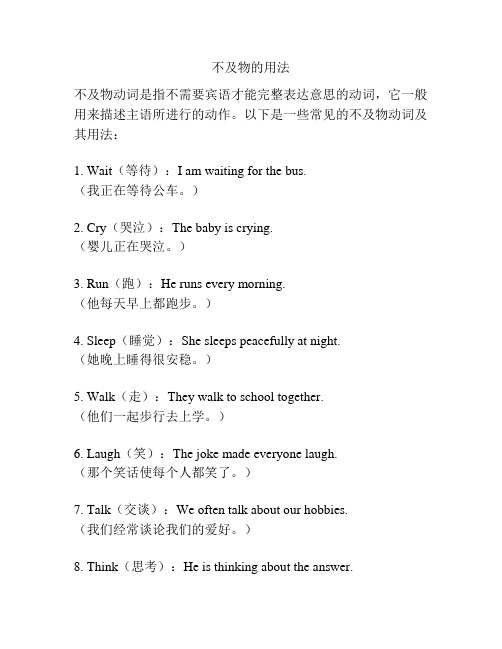
不及物的用法
不及物动词是指不需要宾语才能完整表达意思的动词,它一般用来描述主语所进行的动作。
以下是一些常见的不及物动词及其用法:
1. Wait(等待):I am waiting for the bus.
(我正在等待公车。
)
2. Cry(哭泣):The baby is crying.
(婴儿正在哭泣。
)
3. Run(跑):He runs every morning.
(他每天早上都跑步。
)
4. Sleep(睡觉):She sleeps peacefully at night.
(她晚上睡得很安稳。
)
5. Walk(走):They walk to school together.
(他们一起步行去上学。
)
6. Laugh(笑):The joke made everyone laugh.
(那个笑话使每个人都笑了。
)
7. Talk(交谈):We often talk about our hobbies.
(我们经常谈论我们的爱好。
)
8. Think(思考):He is thinking about the answer.
(他正在考虑答案。
)
9. Sing(唱歌):She sings beautifully.
(她唱得很美。
)
10. Dance(跳舞):They dance gracefully on the stage. (他们在舞台上跳舞优美。
)。
10个不及物动词例子大全
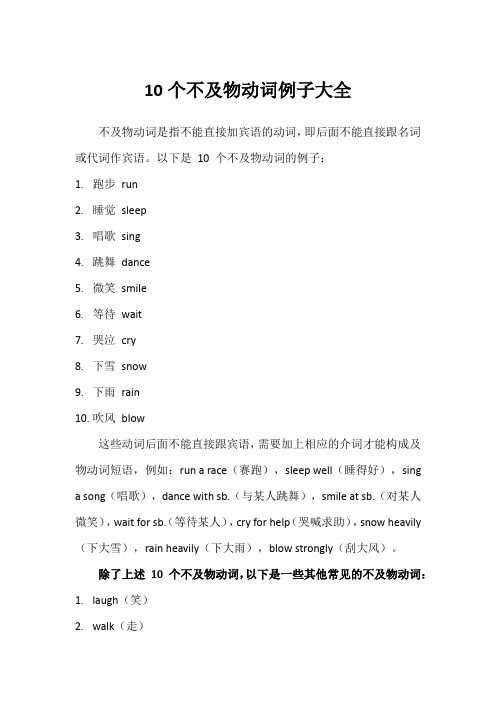
10个不及物动词例子大全
不及物动词是指不能直接加宾语的动词,即后面不能直接跟名词或代词作宾语。
以下是10 个不及物动词的例子:
1.跑步run
2.睡觉sleep
3.唱歌sing
4.跳舞dance
5.微笑smile
6.等待wait
7.哭泣cry
8.下雪snow
9.下雨rain
10.吹风blow
这些动词后面不能直接跟宾语,需要加上相应的介词才能构成及物动词短语,例如:run a race(赛跑),sleep well(睡得好),sing a song(唱歌),dance with sb.(与某人跳舞),smile at sb.(对某人微笑),wait for sb.(等待某人),cry for help(哭喊求助),snow heavily (下大雪),rain heavily(下大雨),blow strongly(刮大风)。
除了上述10 个不及物动词,以下是一些其他常见的不及物动词:
ugh(笑)
2.walk(走)
3.swim(游泳)
4.talk(说话)
5.think(思考)
6.hope(希望)
7.dream(梦想)
8.work(工作)
9.study(学习)
10.live(生活)
这些动词都不能直接跟宾语,需要加上适当的介词或副词才能构成及物动词短语。
例如,talk to/with sb.(与某人交谈),think about sth.(思考某事),hope for sth.(希望某事),dream of sth.(梦想某事),work on sth.(从事某事),study for sth.(为某事学习),live in sp.(住在某地)。
汉语常见的40个不及物动词
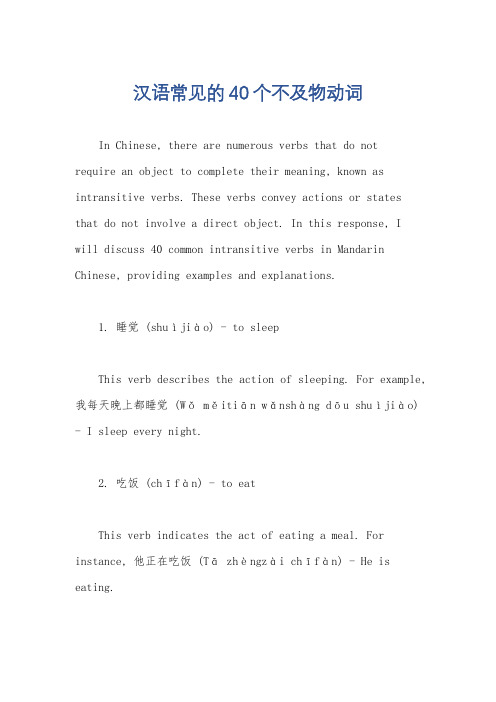
汉语常见的40个不及物动词In Chinese, there are numerous verbs that do notrequire an object to complete their meaning, known as intransitive verbs. These verbs convey actions or statesthat do not involve a direct object. In this response, Iwill discuss 40 common intransitive verbs in Mandarin Chinese, providing examples and explanations.1. 睡觉(shuìjiào) - to sleepThis verb describes the action of sleeping. For example, 我每天晚上都睡觉(Wǒ měitiān wǎnshàng dōu shuìjiào) - I sleep every night.2. 吃饭(chīfàn) - to eatThis verb indicates the act of eating a meal. For instance, 他正在吃饭(Tā zhèngzài chīfàn) - He is eating.3. 喝水(hēshuǐ) - to drink waterThis verb signifies the action of drinking water. An example sentence would be 我渴了,想喝水(Wǒ kěle, xiǎng hēshuǐ) - I'm thirsty, I want to drink water.4. 走路(zǒulù) - to walkThis verb describes the activity of walking. For example, 我每天早上都走路去上班(Wǒ měitiān zǎoshangdōu zǒulù qù shàngbān) - I walk to work every morning.5. 跑步(pǎobù) - to runThis verb indicates the action of running. For instance, 他每天都去公园跑步(Tā měitiān dōu qù gōngyuánpǎobù) - He goes to the park to run every day.6. 坐(zuò) - to sitThis verb signifies the act of sitting. An example sentence would be 她喜欢坐在窗边看书(Tā xǐhuān zuòzài chuāngbiān kànshū) - She likes to sit by the window and read.7. 站(zhàn) - to standThis verb describes the state of standing. For example, 他站在门口等我(Tā zhàn zài ménkǒu děng wǒ) - He is standing at the door waiting for me.8. 游泳(yóuyǒng) - to swimThis verb indicates the action of swimming. For instance, 夏天的时候我喜欢去海边游泳(Xiàtiān de shíhou wǒ xǐhuān qù hǎibiān yóuyǒng) - I like to swim at the beach in the summer.9. 跳舞(tiàowǔ) - to danceThis verb signifies the act of dancing. An example sentence would be 她在生日派对上跳舞(Tā zài shēngrìpàiduì shàng tiàowǔ) - She is dancing at the birthday party.10. 笑(xiào) - to laughThis verb describes the action of laughing. For example, 她听到笑话后哈哈大笑(Tā tīngdào xiàohuà hòu hāhādàxiào) - She laughed heartily after hearing the joke.11. 哭(kū) - to cryThis verb indicates the action of crying. For instance, 孩子受伤了,开始哭了起来(Háizi shòushāngle, kāishǐkūle qǐlai) - The child got hurt and started crying.12. 看(kàn) - to lookThis verb signifies the act of looking. An example sentence would be 我正在看电影(Wǒ zhèngzài kàndiànyǐng) - I am watching a movie.13. 听(tīng) - to listenThis verb describes the action of listening. Forexample, 我喜欢听音乐(Wǒ xǐhuān tīng yīnyuè) - Ilike to listen to music.14. 说话(shuōhuà) - to speakThis verb indicates the action of speaking. For instance, 他正在和朋友说话(Tā zhèngzài hé péngyoushuōhuà) - He is speaking with his friend.15. 唱歌(chànggē) - to singThis verb signifies the act of singing. An example sentence would be 她在音乐会上唱歌(Tā zài yīnyuèhuìshàng chànggē) - She sings at the concert.16. 学习(xuéxí) - to studyThis verb describes the action of studying. For example, 我每天晚上都在家学习(Wǒ měitiān wǎnshàng dōu zàijiā xuéxí) - I study at home every evening.17. 工作(gōngzuò) - to workThis verb indicates the action of working. For instance, 我每天早上九点开始工作(Wǒ měitiān zǎoshang jiǔ diǎnkāishǐ gōngzuò) - I start working at 9 am every morning.18. 着急(zháojí) - to worryThis verb signifies the state of being worried. An example sentence would be 她为考试着急(Tā wèi kǎoshìzháojí) - She is worried about the exam.19. 高兴(gāoxìng) - to be happyThis verb describes the state of being happy. For example, 我听到好消息感到很高兴(Wǒ tīngdào hǎo xiāoxi gǎndào hěn gāoxìng) - I feel very happy after hearing the good news.20. 生气(shēngqì) - to get angryThis verb indicates the state of getting angry. For instance, 他因为被误解而生气(Tā yīnwèi bèi wùjiě érshēngqì) - He got angry because he was misunderstood.21. 累(lèi) - to be tiredThis verb signifies the state of being tired. An example sentence would be 我工作了一整天,感觉很累(Wǒgōngzuòle yī zhěngtiān, gǎnjué hěn lèi) - I worked the whole day and feel very tired.22. 饿(è) - to be hungryThis verb describes the state of being hungry. For example, 我还没吃午饭,现在很饿(Wǒ hái méi chī wǔfàn, xiànzài hěn è) - I haven't had lunch yet, and now I'm hungry.23. 渴(kě) - to be thirstyThis verb indicates the state of being thirsty. For instance, 我喝了很多水,但还是很渴(Wǒ hēle hěn duōshuǐ, dàn háishì hěn kě) - I drank a lot of water,but I'm still thirsty.24. 冷(lěng) - to be coldThis verb signifies the state of being cold. An example sentence would be 外面下雪了,感觉很冷(Wàimiànxiàxuěle, gǎnjué hěn lěng) - It's snowing outside,and it feels very cold.25. 热(rè) - to be hotThis verb describes the state of being hot. For example, 夏天的时候天气很热(Xiàtiān de shíhou tiānqì hěn rè) - It's hot in summer.26. 忙(máng) - to be busyThis verb indicates the state of being busy. For instance, 我这几天工作很忙(Wǒ zhè jǐ tiān gōngzuòhěn máng) - I have been busy with work these days.27. 懒(lǎn) - to be lazyThis verb signifies the state of being lazy. An example sentence would be 他总是不愿意做家务,太懒了(Tā zǒngshì bù yuànyì zuò jiāwù, tài lǎnle) - He is always unwilling to do housework, so lazy.28. 担心(dānxīn) - to worryThis verb describes the action of worrying. For example, 她担心孩子的安全(Tā dānxīn háizi de ānquán) - She worries about her child's safety.29. 害怕(hàipà) - to be afraidThis verb indicates the state of being afraid. For instance, 我害怕黑暗(Wǒ hàipà hēi'àn) - I'm afraid of the dark.30. 惊讶(jīngyà) - to be surprisedThis verb signifies the state of being surprised. An example sentence would be 他听到这个消息非常惊讶(Tātīngdào zhège xiāoxi fēicháng jīngyà) - He was verysurprised to hear this news.31. 骄傲(jiāo'ào) - to be proudThis verb describes the state of being proud. For example, 她对自己的成绩感到很骄傲(Tā duì zìjǐ dechéngjī gǎndào hěn jiāo'ào) - She feels very proud of her achievements.32. 羡慕(xiànmù) - to be enviousThis verb indicates the state of being envious. For instance, 我羡慕他的才华(Wǒ xiànmù tā de cáihuá) - I envy his talent.33. 喜欢(xǐhuān) - to likeThis verb signifies the state of liking something. An example sentence would be 我喜欢看电影(Wǒ xǐhuān kàn diànyǐng) - I like watching movies.34. 讨厌(tǎoyàn) - to dislikeThis verb describes the state of disliking something. For example, 我讨厌吃辣的食物(Wǒ tǎoyàn chī là deshíwù) - I dislike eating spicy food.35. 爱(ài) - to loveThis verb indicates the state of loving something or someone. For instance, 我爱我的家人(Wǒ ài wǒ dejiārén) - I love my family.36. 需要(xūyào) - to needThis verb signifies the action of needing something. An example sentence would be 我需要你的帮助(Wǒ xūyào nǐ de bāngzhù) - I need your help.37. 想(xiǎng) - to wantThis verb describes the desire to have or do something. For example, 我想吃冰淇淋(Wǒ xiǎng chī bīngqílín) - I want to eat ice cream.38. 希望(xīwàng) - to hopeThis verb indicates the action of hoping for something. For instance, 我希望明天天气好(Wǒ xīwàng míngtiāntiānqì hǎo) - I hope the weather is good tomorrow.39. 相信(xiāngxìn) - to believeThis verb signifies the action of believing in something. An example sentence would be 我相信他会成功(Wǒ xiāngxìn tā huì chénggōng) - I believe he will succeed.40. 怀念(huáiniàn) - to missThis verb describes the action of missing someone or something. For example, 我怀念小时候的玩伴(Wǒ huáiniàn xiǎoshíhòu de wánbàn) - I miss my childhood playmates.These 40 intransitive verbs cover a wide range of actions, states, and emotions in Mandarin Chinese.Mastering these verbs will enhance your ability to express yourself in various situations and engage in meaningful conversations.。
高中英语20个不及物动词常见短语动词

常见20个不及物动词ache appear arise belong coughdepart die remain hesitate falloccur slip sitobject tolead toappeal tocontribute toresult insympathize withrely on高中英语常见短语动词1.add to增加,增进add … to把…加进…add up相加add up to总计,所有这一切说明1) I don't think these facts will ________ anything.2) Fifty new books have been ________ the library.3) The music _________ our enjoyment of the film.4) You must have made a mistake when you _______ the bill ________.( add up to, added to, add to, added…up )说解:一、作及物动词,意为“加,增加,增添”。
The fire is going out, will you add some wood?火要灭了,请你加点柴,好吗?In some films, he added folk music, which he wrote himself.他在一些影片中加入了他自己谱写的民间音乐。
二、作及物动词,意为“补充说”、“接着说”,后常接that从句。
例如:She added that he should never come to see her again.她又说,他再也不必来看她了。
He added that they would return a week later.他接着说他们一周后回来。
“At your age you should give all your attention to your studies,” her father added.她的父亲又说:“像你这样的年纪应当把精力放在学习上。
及物不及物动词总结表

及物不及物动词总结表动词是语言中最基本的词类之一,它用于描述人们所进行的动作或者状态。
根据其是否需要接受动作的对象,动词可以分为及物动词和不及物动词。
及物动词需要跟宾语,而不及物动词则没有宾语。
在英语中,掌握不同动词的及物性质是学习和理解语言的关键之一。
下面是我总结的一些常见及物动词和不及物动词:及物动词:1. Ask:询问或请求某人提供信息或帮助。
例句:She asked me to pass her the book.2. Teach:告知或传授某人知识、技能或经验。
例句:He taught me how to swim.3. Show:展示或展示给某人看。
例句:She showed him her new painting.4. Give:将某物交给某人。
例句:He gave me a present for my birthday.5. Tell:告诉或向某人说明。
例句:She told me a secret.6. Send:寄送或派遣某物或某人。
例句:He sent me a postcard from his vacation.7. Bring:把某物带来某个地方。
例句:Please bring me a cup of tea.8. Offer:主动给予或提供某物或某项服务。
例句:They offered me a job at their company.9. Write:书写或写下某物。
例句:He wrote a letter to his friend.10. Show:展示或展示给某人看。
例句:She showed him her new painting.不及物动词:1. Sleep:睡觉或休息。
例句:I usually sleep for eight hours at night.2. Arrive:到达某个地方。
例句:The train arrived at the station on time.3. Fall:跌倒或落下。
英语常见的不及物动词
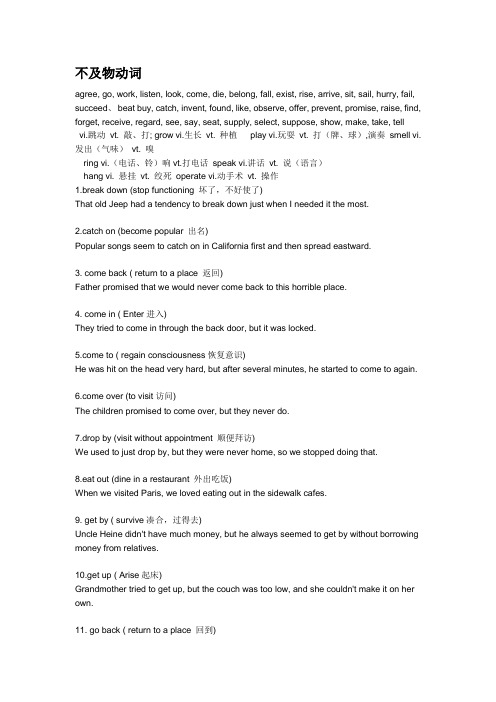
不及物动词agree, go, work, listen, look, come, die, belong, fall, exist, rise, arrive, sit, sail, hurry, fail, succeed、beat buy, catch, invent, found, like, observe, offer, prevent, promise, raise, find, forget, receive, regard, see, say, seat, supply, select, suppose, show, make, take, tell vi.跳动vt. 敲、打; grow vi.生长vt. 种植play vi.玩耍vt. 打(牌、球),演奏smell vi.发出(气味)vt. 嗅ring vi.(电话、铃)响vt.打电话speak vi.讲话vt. 说(语言)hang vi. 悬挂vt. 绞死operate vi.动手术vt. 操作1.break down (stop functioning 坏了,不好使了)That old Jeep had a tendency to break down just when I needed it the most.2.catch on (become popular 出名)Popular songs seem to catch on in California first and then spread eastward.3. come back ( return to a place 返回)Father promised that we would never come back to this horrible place.4. come in ( Enter进入)They tried to come in through the back door, but it was locked.e to ( regain consciousness恢复意识)He was hit on the head very hard, but after several minutes, he started to come to again.e over (to visit访问)The children promised to come over, but they never do.7.drop by (visit without appointment 顺便拜访)We used to just drop by, but they were never home, so we stopped doing that.8.eat out (dine in a restaurant 外出吃饭)When we visited Paris, we loved eating out in the sidewalk cafes.9. get by ( survive凑合,过得去)Uncle Heine didn't have much money, but he always seemed to get by without borrowing money from relatives.10.get up ( Arise起床)Grandmother tried to get up, but the couch was too low, and she couldn't make it on her own.11. go back ( return to a place 回到)It's hard to imagine that we will ever go back to Lithuania.12.go on ( Continue继续)He would finish one Dickens novel and then just go on to the next.13. go on (2) ( Happen发生)The cops heard all the noise and stopped to see what was going on.14. grow up ( get older变老)Charles grew up to be a lot like his father.15.keep away ( remain at a distance保持距离)The judge warned the stalker to keep away from his victim's home.16. keep on (+动名称) ( continue with the same继续保持)He tried to keep on singing long after his voice was ruined.17. pass out ( lose consciousness, faint昏过去,晕)He had drunk too much; he passed out on the sidewalk outside the bar.18. show off ( demonstrate haughtily 炫耀)Whenever he sat down at the piano, we knew he was going to show off.19. show up( Arrive到达,出现)Day after day, Efrain showed up for class twenty minutes late.20. wake up (arouse from sleep醒来)I woke up when the rooster crowed.。
汉语常见的40个不及物动词
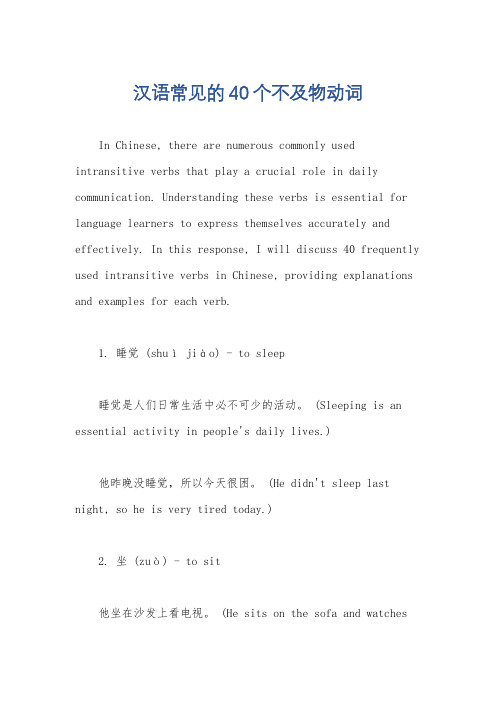
汉语常见的40个不及物动词In Chinese, there are numerous commonly usedintransitive verbs that play a crucial role in daily communication. Understanding these verbs is essential for language learners to express themselves accurately and effectively. In this response, I will discuss 40 frequently used intransitive verbs in Chinese, providing explanations and examples for each verb.1. 睡觉(shuì jiào) - to sleep睡觉是人们日常生活中必不可少的活动。
(Sleeping is an essential activity in people's daily lives.)他昨晚没睡觉,所以今天很困。
(He didn't sleep last night, so he is very tired today.)2. 坐(zuò) - to sit他坐在沙发上看电视。
(He sits on the sofa and watchesTV.)请坐,别客气。
(Please have a seat, don't be polite.)3. 站(zhàn) - to stand他站在门口等着朋友。
(He stands at the door waiting for his friend.)请站起来,让我坐一下。
(Please stand up and let me sit for a moment.)4. 跑(pǎo) - to run他每天早上去公园跑步锻炼身体。
常见不及物动词及搭配
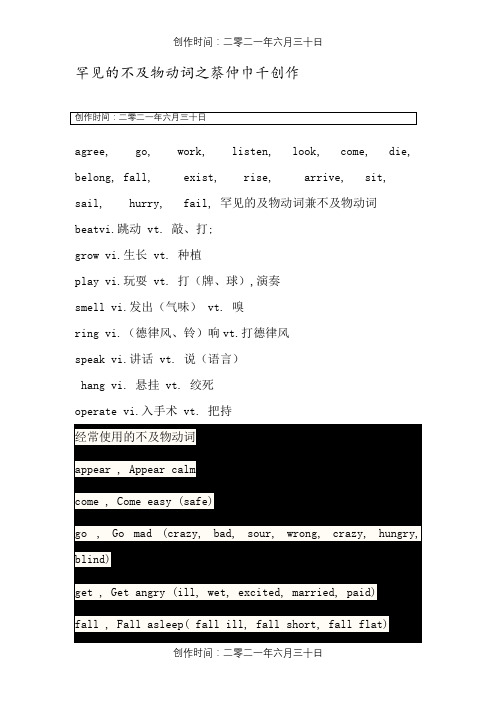
agree, go, work, listen, look, come, die, belong, fall, exist, rise, arrive, sit, sail, hurry, fail, 罕见的及物动词兼不及物动词beatvi.跳动 vt. 敲、打;grow vi.生长 vt. 种植play vi.玩耍 vt. 打(牌、球),演奏smell vi.发出(气味) vt. 嗅ring vi.(德律风、铃)响vt.打德律风speak vi.讲话 vt. 说(语言)hang vi. 悬挂 vt. 绞死operate vi.入手术 vt. 把持经常使用的不及物动词appear , Appear calmcome , Come easy (safe)go , Go mad (crazy, bad, sour, wrong, crazy, hungry, blind)get , Get angry (ill, wet, excited, married, paid)fall , Fall asleep( fall ill, fall short, fall flat)feel , Feel good (sleepy)keep , Keep quiet (silent)look , Look fit (well, young, tired)make, Make certain (sure, ready, a good teacher) prove , Prove an effective method (correct, accurate) remain , Remain still (unchanged)rest, Rest satisfied (content)rise, Rise redseem , Seem happystand , Stand stillstay , Stay young (stay fresh, the same)turn, Turn teacher =become a teacher (yellow)turn out , Turn out true罕见不及物动词搭配1.break down (stop functioning 坏了, 欠好使了)That old Jeep had a tendency to break down just when I needed it the most.2.catch on (become popular 知名)Popular songs seem to catch on in California first and then spread eastward.3. come back ( return to a place 返回)Father promised that we would never come back to this horrible place.4. come in ( Enter进入)They tried to come in through the back door, but it was locked.e to ( regain consciousness恢复意识)He was hit on the head very hard, but after several minutes, he started to come to again.e over (to visit访问)The children promised to come over, but they never do.7.drop by (visit without appointment 顺便访问)We used to just drop by, but they were never home, so we stopped doing that.8.eat out (dine in a restaurant 外出吃饭)When we visited Paris, we loved eating out in the sidewalk cafes.9. get by ( survive对付, 过得去)Uncle Heine didn't have much money, but he always seemed to get by without borrowing money from relatives.10.get up ( Arise起床)Grandmother tried to get up, but the couch was too low, and she couldn't make it on her own.11. go back ( return to a place 回到)It's hard to imagine that we will ever go back to Lithuania.12.go on ( Continue继续 )He would finish one Dickens novel and then just go on to the next.13. go on (2) ( Happen发生 )The cops heard all the noise and stopped to see what was going on.14. grow up ( get older变老 )Charles grew up to be a lot like his father.15.keep away ( remain at a distance坚持距离 )The judge warned the stalker to keep away from hisvictim's home.16. keep on (+动名称) ( continue with the same继续坚持) He tried to keep on singing long after his voice was ruined.17. pass out ( lose consciousness, faint昏过去, 晕)He had drunk too much; he passed out on the sidewalk outside the bar.18. show off ( demonstrate haughtily 炫耀)Whenever he sat down at the piano, we knew he was going to show off.19. show up( Arrive达到, 呈现)Day after day, Efrain showed up for class twenty minutes late.20. wake up (arouse from sleep醒来)I woke up when the rooster crowed.接不定式(而不接动名词)作宾语的24个经常使用动词afford to do sth. 负担得起做某事agree to do sth. 同意做某事arrange to do sth.安插做某事ask to do sth. 要求做某事beg to do sth. 请求做某事care to do sth. 想要做某事choose to do sth. 决定做某事decide to do sth. 决定做某事demand to do sth. 要求做某事determine to do sth. 决心做某事expect to do sth. 期待做某事fear to do sth. 害怕做某事help to do sth. 帮手做某事hope to do sth. 希望做某事learn to do sth. 学习做某事manage to do sth. 设法做某事offer to do sth. 主动提出做某事plan to do sth. 计划做某事prepare to do sth. 准备做某事pretend to do sth. 假装做某事promise to do sth. 承诺做某事refuse to do sth. 拒绝做某事want to do sth. 想要做某事wish to do sth. 希望做某事注:有些不及物动词后习惯上也接不定式, 不接动名词:aim to do sth. 筹算做某事fail to do sth. 未能做某事long to do sth. 渴望做某事happen to do sth. 碰巧做某事hesitate to do sth. 犹豫做某事struggle to do sth. 努力做某事跟介词搭配的不及物动词count on 依靠embark on上路gamble on以……赌博insist on坚持……rely on依靠theorize on 对……推理, 对……建立理论harp on 老提到……calculate on 指望, 依靠concentrate on 集中到……depend on依靠reckon on盼望, 指望……account for 说明, 解释……answer for回答……apologize for为……报歉suffer for为……受苦pay for 为……付钱look for 寻找atone for赔偿, 赔偿make up for赔偿stand for代表compensate for 赔偿abstain from 有意回避, 弃权desist from 停止refrain from抑制, 忍住shrink from 回避suffer from 受苦, 患病benefit from 获益于flinch from 退缩escape from 从……逃开approve of 同意boast of 吹法螺consist of 由……组成despair of 失望dream of 梦想做某事repent of 后悔, 后悔believe in 相信……persevere in 坚持……revel in 陶醉, 着迷于……succeed in 在某方面胜利delight in 为……高兴join in 加入……participate in 介入……persist in 坚持……specialize in 专门从事某事, 在某方面专长aim at 瞄准于……chafe at 恼怒, 不满frown at 向……皱眉头scowl at 沉下脸……, 对……皱眉laugh at 讥笑smile at向……微笑work at 从事于……, 用功于……look at 看着……attend to 介入……certify to 证明……allude to 暗示……confess to 供认……descend to 下降到……object to 反对……react to 对某事作出反应refer to 提到……resort to 求助, 采纳……see to 检查……submit to 提交……testify to 标明, 说明……turn to 转向……fall to 下跌, 减弱。
不及物动词用法
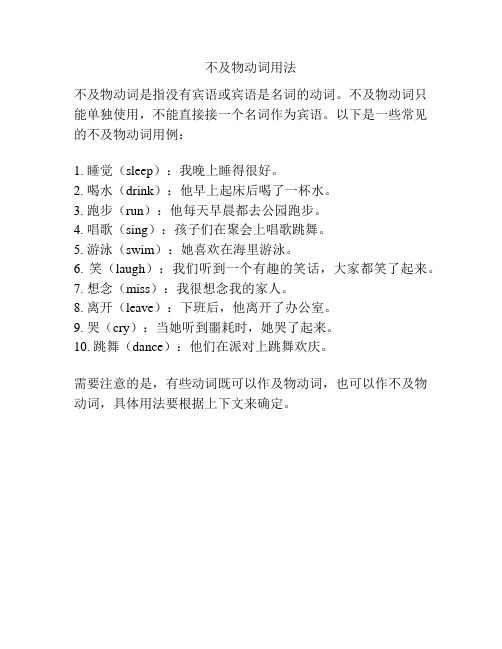
不及物动词用法
不及物动词是指没有宾语或宾语是名词的动词。
不及物动词只能单独使用,不能直接接一个名词作为宾语。
以下是一些常见的不及物动词用例:
1. 睡觉(sleep):我晚上睡得很好。
2. 喝水(drink):他早上起床后喝了一杯水。
3. 跑步(run):他每天早晨都去公园跑步。
4. 唱歌(sing):孩子们在聚会上唱歌跳舞。
5. 游泳(swim):她喜欢在海里游泳。
6. 笑(laugh):我们听到一个有趣的笑话,大家都笑了起来。
7. 想念(miss):我很想念我的家人。
8. 离开(leave):下班后,他离开了办公室。
9. 哭(cry):当她听到噩耗时,她哭了起来。
10. 跳舞(dance):他们在派对上跳舞欢庆。
需要注意的是,有些动词既可以作及物动词,也可以作不及物动词,具体用法要根据上下文来确定。
高中常见不及物动词及中文释义
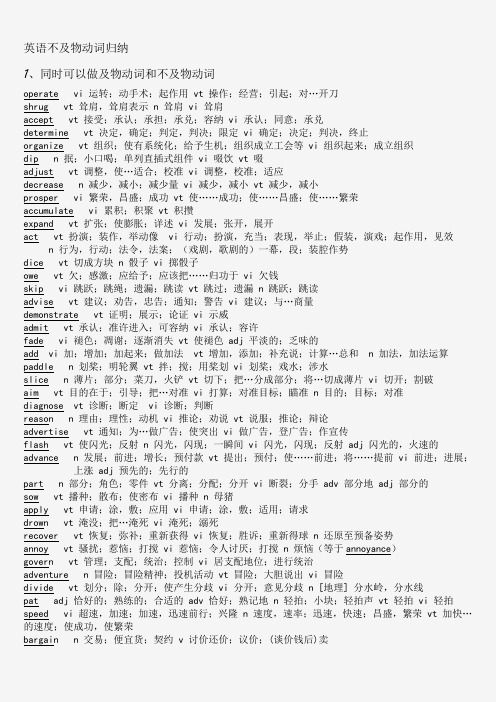
英语不及物动词归纳1、同时可以做及物动词和不及物动词operate vi 运转;动手术;起作用 vt 操作;经营;引起;对…开刀shrug vt 耸肩,耸肩表示 n 耸肩 vi 耸肩accept vt 接受;承认;承担;承兑;容纳 vi 承认;同意;承兑determine vt 决定,确定;判定,判决;限定 vi 确定;决定;判决,终止organize vt 组织;使有系统化;给予生机;组织成立工会等 vi 组织起来;成立组织dip n 抿;小口喝;单列直插式组件 vi 啜饮 vt 啜adjust vt 调整,使…适合;校准 vi 调整,校准;适应decrease n 减少,减小;减少量 vi 减少,减小 vt 减少,减小prosper vi 繁荣,昌盛;成功 vt 使……成功;使……昌盛;使……繁荣accumulate vi 累积;积聚 vt 积攒expand vt 扩张;使膨胀;详述 vi 发展;张开,展开act vt 扮演;装作,举动像 vi 行动;扮演,充当;表现,举止;假装,演戏;起作用,见效n 行为,行动;法令,法案;(戏剧,歌剧的)一幕,段;装腔作势dice vt 切成方块 n 骰子 vi 掷骰子owe vt 欠;感激;应给予;应该把……归功于 vi 欠钱skip vi 跳跃;跳绳;遗漏;跳读 vt 跳过;遗漏 n 跳跃;跳读advise vt 建议;劝告,忠告;通知;警告 vi 建议;与…商量demonstrate vt 证明;展示;论证 vi 示威admit vt 承认;准许进入;可容纳 vi 承认;容许fade vi 褪色;凋谢;逐渐消失 vt 使褪色 adj 平淡的;乏味的add vi 加;增加;加起来;做加法 vt 增加,添加;补充说;计算…总和 n 加法,加法运算paddle n 划桨;明轮翼 vt 拌;搅;用桨划 vi 划桨;戏水;涉水slice n 薄片;部分;菜刀,火铲 vt 切下;把…分成部分;将…切成薄片 vi 切开;割破aim vt 目的在于;引导;把…对准 vi 打算;对准目标;瞄准 n 目的;目标;对准diagnose vt 诊断;断定 vi 诊断;判断reason n 理由;理性;动机 vi 推论;劝说 vt 说服;推论;辩论advertise vt 通知;为…做广告;使突出 vi 做广告,登广告;作宣传flash vt 使闪光;反射 n 闪光,闪现;一瞬间 vi 闪光,闪现;反射 adj 闪光的,火速的advance n 发展;前进;增长;预付款 vt 提出;预付;使……前进;将……提前 vi 前进;进展;上涨 adj 预先的;先行的part n 部分;角色;零件 vt 分离;分配;分开 vi 断裂;分手 adv 部分地 adj 部分的sow vt 播种;散布;使密布 vi 播种 n 母猪apply vt 申请;涂,敷;应用 vi 申请;涂,敷;适用;请求drown vt 淹没;把…淹死 vi 淹死;溺死recover vt 恢复;弥补;重新获得 vi 恢复;胜诉;重新得球 n 还原至预备姿势annoy vt 骚扰;惹恼;打搅 vi 惹恼;令人讨厌;打搅 n 烦恼(等于annoyance)govern vt 管理;支配;统治;控制 vi 居支配地位;进行统治adventure n 冒险;冒险精神;投机活动 vt 冒险;大胆说出 vi 冒险divide vt 划分;除;分开;使产生分歧 vi 分开;意见分歧 n [地理] 分水岭,分水线pat adj 恰好的;熟练的;合适的 adv 恰好;熟记地 n 轻拍;小块;轻拍声 vt 轻拍 vi 轻拍speed vi 超速,加速;加速,迅速前行;兴隆 n 速度,速率;迅速,快速;昌盛,繁荣 vt 加快…的速度;使成功,使繁荣bargain n 交易;便宜货;契约 v 讨价还价;议价;(谈价钱后)卖elect adj 选出的;当选的;卓越的 n 被选的人;特殊阶层;上帝的选民 vt 选举;选择;推选 vi作出选择;进行选举rejuvenate vt 使年轻;使更新;使恢复精神;使复原 vi 复原;变年轻appeal vi 呼吁,恳求;上诉;诉诸,求助;有吸引力,迎合爱好;(体育比赛中)诉诸裁判 n 呼吁,请求;吸引力,感染力;上诉;诉诸裁判 vt 将…上诉,对…上诉apologize vi 道歉;辩解;赔不是 vt 道歉;谢罪;辩白educate vt 教育;培养;训练 vi 教育;训练perform vt 执行;完成;演奏 vi 执行,机器运转;表演spread vi 传播;伸展 vt 传播,散布;展开;伸展;铺开 n 传播;伸展 adj 伸展的bathe vt 沐浴;用水洗 vi 洗澡;沐浴 n 洗澡;游泳embrace vt 拥抱;信奉,皈依;包含 vi 拥抱 n 拥抱relate vt 叙述;使…有联系 vi 涉及;认同;符合;与…有某种联系approve vt 批准;赞成;为…提供证据 vi 批准;赞成;满意mate n 助手,大副;配偶;同事;配对物 vt 使配对;使一致;结伴 vi 交配;成配偶;紧密配合applaud vt 赞同;称赞;向…喝彩 vi 喝彩;鼓掌欢迎entertain vt 娱乐;招待;怀抱;容纳 vi 款待poison vt 污染;使中毒,放毒于;败坏;阻碍 vi 放毒,下毒 n 毒药,毒物;酒;有毒害的事物; [助剂] 抑制剂 adj 有毒的stare vi 凝视,盯着看;显眼 vt 凝视,盯着看 n 凝视;注视battle n 战役;斗争 vi 斗争;作战 vt 与…作战erupt vi 爆发;喷出;发疹;长牙 vt 爆发;喷出mature adj 成熟的;充分考虑的;到期的;成年人的 vi 成熟;到期 vt 使…成熟;使…长成;慎重作出argue vi 争论,辩论;提出理由 vt 辩论,争论;证明;说服exist vi 存在;生存;生活;继续存在 vt 蒸,散发;用蒸汽处理 n 蒸汽;精力 vi 蒸,冒水汽 adj 蒸汽的remain vi 保持;依然;留下;剩余;逗留;残存 n 遗迹;剩余物,残骸associate vi 交往;结交 n 同事,伙伴;关联的事物 vt 联想;使联合;使发生联系 adj 副的;联合的melt vi 熔化,溶解;渐混 vt 使融化;使熔化;使软化;使感动 n 熔化;熔化物balance n 平衡;余额;匀称 vt 使平衡;结算;使相称 vi 保持平衡;相称;抵销press vt 压;按;逼迫;紧抱 vi 压;逼;重压 n 压;按;新闻;出版社;[印刷] 印刷机strike vi 打,打击;罢工;敲,敲击;抓;打动;穿透 vt 打,击;罢工;撞击,冲击;侵袭;打动;到达 n 罢工;打击;殴打benefit n 利益,好处;救济金 vt 有益于,对…有益 vi 受益,得益fire n 火;火灾;炮火;炉火;热情;激情;磨难 vt 点燃;解雇;开除;使发光;烧制;激动;放枪 vi 着火;射击;开枪;激动;烧火rephrase vt 改述;重新措辞bid vt 投标;出价;表示;吩咐 vi 投标;吩咐 n 出价;叫牌;努力争取mine n 矿,矿藏;矿山,矿井;地雷,水雷 vt 开采,采掘;在…布雷 vi 开矿,采矿;埋设地雷 pron 我的behave vi 表现;(机器等)运转;举止端正;(事物)起某种作用 vt 使守规矩;使表现得…fear n 害怕;恐惧;敬畏;担心 vt 害怕;敬畏;为…担心 vi 害怕;敬畏;为…担心prevent vt 预防,防止;阻止 vi 妨碍,阻止struggle vi 奋斗,努力;挣扎 n 努力,奋斗;竞争 vt 使劲移动;尽力使得bite vt 咬;刺痛 n 咬;一口;咬伤;刺痛 vi 咬;刺痛reproduce vt 复制;再生;生殖;使…在脑海中重现 vi 复制;繁殖broadcast vt 播送,播放;(无线电或电视)广播;播撒(种子) vi 广播,播送;播放 n 广播;播音;广播节目 adj 广播的profit n 利润;利益 vi 获利;有益 vt 有益于bend vt 使弯曲;使屈服;使致力;使朝向 vi 弯曲,转弯;屈服;倾向;专心于 n 弯曲raft n 筏;救生艇;(美)大量 vt 筏运;制成筏 vi 乘筏succeed vi 成功;继承;继任;兴旺 vt 继承;接替;继…之后bleed vt 使出血;榨取 vi 流血;渗出;悲痛float vt 使漂浮;实行 vi 浮动;飘动,散播;摇摆;付诸实施 n 彩车,花车;漂流物;浮舟;浮萍require vt 需要;要求;命令burst vi 爆发,突发;爆炸 vt 爆发,突发;爆炸 n 爆发,突发;爆炸react vi 反应;影响;反抗;起反作用 vt 使发生相互作用;使起化学反应boil vi 煮沸,沸腾;激动,激昂 vt 煮沸,烧开;使…激动;使…蒸发 n 沸腾,煮沸;疖子rank n 排;等级;军衔;队列 adj 讨厌的;恶臭的;繁茂的 vt 排列;把…分等 vi 列为;列队suffer vt 遭受;忍受;经历 vi 遭受,忍受;受痛苦;经验;受损害calm adj 静的,平静的;沉着的 vt 使平静;使镇定 vi 平静下来;镇定下来 n 风平浪静gather vt 收集;收割;使…聚集;使…皱起 vi 聚集;化脓;皱起 n 聚集;衣褶;收获量research n 研究;调查 vi 研究;调查 vt 研究;调查range n 范围;幅度;排;山脉 vi (在...内)变动;平行,列为一行;延伸;漫游;射程达到 vt 漫游;放牧;使并列;归类于;来回走动kid n 小孩;小山羊 vt 欺骗;取笑;戏弄 vi 欺骗;取笑;戏弄 adj 小山羊皮制的;较年幼的pray vt 祈祷;恳求;央求 vi 祈祷;请;恳求rap vt 抢走;轻敲;敲击致使;使着迷 vi 敲击;交谈 n 轻敲bother vt 烦扰,打扰;使……不安;使……恼怒 vi 操心,麻烦;烦恼 n 麻烦;烦恼cheat vt 欺骗;骗取 vi 欺骗;作弊 n 欺骗,作弊;骗子rise vi 上升;增强;起立;高耸 vt 使…飞起;使…浮上水面 n 上升;高地;增加;出现cackle n 饶舌;咯咯声;闲谈 vi 咯咯叫;喋喋不休;饶舌 vt 格格笑著表示;喋喋不休地说strengthen vt 加强;巩固 vi 变强;变坚挺contract vi 收缩;感染;订约 vt 感染;订约;使缩短 n 合同;婚约cooperate vi 合作,配合;协力panic n 恐慌,惊慌;大恐慌 adj 恐慌的;没有理由的 vt 使恐慌 vi 十分惊慌communicate vi 通讯,传达;相通;交流;感染 vt 传达;感染;显露deal vt 处理;给予;分配;发牌 vi 处理;讨论;对待;做生意 n 交易;(美)政策;待遇;份量vote n 投票,选举;选票;得票数 vt 提议,使投票;投票决定;公认 vi 选举,投票campaign vi 作战;参加竞选;参加活动 n 运动;活动;战役refer vi 参考;涉及;提到;查阅 vt 涉及;委托;归诸于;使…求助于boom vt 使兴旺;发隆隆声 vi 急速发展;发隆隆声 n 繁荣;吊杆;隆隆声flow vi 流动,涌流;川流不息;飘扬 vt 淹没,溢过 n 流动;流量;涨潮,泛滥survive vt 幸存;生还;幸免于;比...活得长 vi 幸存;活下来chat vi 聊天;闲谈 vt 与…搭讪;与…攀谈 n 聊天;闲谈vi 踌躇,犹豫;不愿 vt 踌躇,犹豫;有疑虑,不愿意resist vi 抵抗,抗拒;忍耐 vt 抵抗;忍耐,忍住 n [助剂] 抗蚀剂;防染剂clap vi 鼓掌,拍手;啪地关上 vt 拍手,鼓掌;轻轻拍打某人 n 鼓掌;拍手声register vt 登记;注册;记录;挂号邮寄;把…挂号;正式提出 vi 登记;注册;挂号 n 登记;注册;记录;寄存器;登记簿record vt 记录,记载;标明;将...录音 vi 记录;录音 n 档案,履历;唱片;最高纪录 adj 创纪录的tap vt 轻敲;轻打;装上嘴子 vi 轻拍;轻击;轻叩 n 水龙头;轻打identify vt 确定;鉴定;识别,辨认出;使参与;把…看成一样 vi 确定;认同;一致retire vi 退休;撤退;退却 vt 退休;离开;收回 n 退休;退隐;退兵信号claw n 爪;螯,钳;爪形器具 vi 用爪抓(或挖) vt 用爪抓(或挖)remark n 注意;言辞 vt 评论;觉察 vi 谈论bow n 弓;鞠躬;船首 vi 鞠躬;弯腰 vt 鞠躬;弯腰 adj 弯曲的fry n 鱼苗;油炸食物 vt 油炸;油煎 vi 油炸;油煎refuel vt 补给燃料 vi 重新得到燃料tear n 眼泪, (撕破的)洞或裂缝, 撕扯 vt 撕掉, 扯下, 扰乱 vi 流泪, 撕破cheer vt 欢呼;使高兴;为…加油 n 欢呼;愉快;心情;令人愉快的事 vi 欢呼;感到高兴insist vt 坚持,强调 vi 坚持,强调concentrate vi 集中;浓缩;全神贯注;聚集 vt 集中;浓缩 n 浓缩,精选;浓缩液resign vt 辞职;放弃;委托;使听从 vi 辞职 n 辞去职务brake vi 刹车 n 闸,刹车;阻碍 vt 刹车repeat vt 重复;复制;背诵 n 重复;副本 vi 重做;重复发生thrill n 激动;震颤;紧张 vt 使…颤动;使…紧张;使…感到兴奋或激动 vi 颤抖;感到兴奋;感到紧张choke vt 呛;使窒息;阻塞;抑制;扑灭 vi 窒息;阻塞;说不出话来 n 窒息;噎;itch n 痒;渴望;疥疮 vi 发痒;渴望 vt 使发痒;使恼怒rot n 腐烂;腐败;腐坏 vi 腐烂;腐败;堕落 vt 使腐烂;使腐朽;使堕落 int (表示厌恶、蔑视、烦恼等)胡说;糟了conclude vt 推断;决定,作结论;结束 vi 推断;断定;决定shave vi 剃须,剃毛 vt 剃,削去;修剪;切成薄片;掠 n 刮脸,剃胡子;修面;<口>侥幸逃过,幸免;剃刀,刮刀garden n 花园;菜园 vt 栽培花木 vi 从事园艺;在园中种植respond vi 回答;作出反应;承担责任 vt 以…回答 n 应答;唱和tidy adj 整齐的;相当大的 vt 整理;收拾;弄整齐 vi 整理;收拾 n 椅子的背罩circulate vi 传播,流传;循环;流通 vt 使循环;使流通;使传播judge vt 判断;审判 n 法官;裁判员 vi 审判;判决scream vi 尖叫;呼啸;发出尖锐刺耳的声音;令人触目惊心 vt 尖声喊叫;大叫大嚷着要求 n 尖叫声;尖锐刺耳的声音;极其滑稽可笑的人consult vt 查阅;商量;向…请教 vi 请教;商议;当顾问camp vi 露营;扎营 vt 扎营;使扎营 n 露营heat n 高温;压力;热度;热烈 vt 使激动;把…加热rhyme n 韵律;韵脚;韵文;押韵词 vt 使押韵;用韵诗表达;把…写作诗 vi 押韵;作押韵诗toast n 干杯;烤面包;接受敬酒的人;(在某领域)广受赞誉的人 vt 向…祝酒,为…干杯 vi 烤火,取暖;使暖和;烘烤(面包片等)conquer vt 战胜,征服;攻克,攻取 vi 胜利;得胜lack vt 缺乏;不足;没有;需要 vi 缺乏;不足;没有 n 缺乏;不足seek vt 寻求;寻找;探索;搜索 vi 寻找;探索;搜索starve vi 饿死;挨饿;渴望 vt 使饿死;使挨饿carve vt 雕刻;切开;开创 vi 切开;做雕刻工作howl vi 咆哮;怒吼;狂吠 vt 狂喊着说;对…吼叫 n 嗥叫;怒号;嚎哭sail vi 航行;启航,开船 n 帆,篷;航行 vt 航行touch vt 接触;触动;使轻度受害 vi 触摸;涉及;接近;提到 n 接触;触觉;格调;少许stretch vt 伸展,张开 vi 伸展 adj 可伸缩的 n 伸展,延伸curse n 诅咒;咒骂 vt 诅咒;咒骂 vi 诅咒;咒骂cast vt 投,抛;计算;浇铸;投射(光、影、视线等) n 投掷,抛;铸件,[古生] 铸型;演员阵容;脱落物 vi 投,抛垂钓鱼钩;计算,把几个数字加起来hunt vt 打猎;搜索 vi 打猎;搜寻 n 狩猎;搜寻salute n 致敬,欢迎;敬礼 vt 行礼致敬,欢迎 vi 致意,打招呼;行礼tour n 旅游,旅行;巡回演出 vt 旅行,在……旅游;在……作巡回演出 vi 旅行,旅游;作巡回演出match vt 使比赛;使相配;敌得过,比得上;相配;与…竞争 vi 比赛;匹配;相配,相称;相比 n 比赛,竞赛;匹配;对手;火柴summarize vt 总结;概述 vi 作总结;作概括participate vi 参与,参加;分享 vt 分享;分担endeavor n 尽力,竭力 vt 竭力做到,试图或力图(做某事) vi 竭力;企图weep vi 哭泣;流泪;哀悼;滴落;渗出液体 vt 哭泣;流泪;悲叹;流出或渗出液体 n 哭泣;眼泪;滴下lean vi 倾斜;倚靠;倾向;依赖 adj 瘦的;贫乏的,歉收的 vt 使倾斜 n 瘦肉;倾斜;倾斜度shake vt 动摇;摇动;震动;握手 vi 动摇;摇动;发抖 n 摇动;哆嗦vary vi 变化;变异;违反 vt 改变;使多样化;变奏debate vt 辩论,争论,讨论 vi 辩论,争论,讨论 n 辩论;辩论会predict vt 预报,预言;预知 vi 作出预言;作预料,作预报continue vi 继续,延续;仍旧,连续 vt 继续说…;使…继续;使…延长loop vi 打环;翻筋斗 n 环;圈;弯曲部分;翻筋斗 vt 使成环;以环连结;使翻筋斗share vt 分享,分担;分配 vi 共享;分担 n 份额;股份weigh vt 权衡;考虑;称…重量 vi 重量为…;具有重要性;成为…的重荷;起锚 n 权衡;称重量crack vt 使破裂;打开;变声 vi 破裂;爆裂 n 裂缝;声变;噼啪声 adj 最好的;高明的manage vt 管理;经营;控制;设法 vi 处理;应付过去ship vt 运送,乘船;以船运送 vi 上船;乘船旅行;当船员 n 船;舰;太空船whisper n 私语;谣传;飒飒的声音 vi 耳语;密谈;飒飒地响 vt 低声说出cycle n 循环;周期;自行车;整套;一段时间 vt 使循环;使轮转 vi 循环;骑自行车;轮转troop n 军队;组;群;多数 vi 群集;成群而行;结队 vt 把(骑兵)编成骑兵连combine vt 使化合;使联合,使结合 vi 联合,结合;化合 n 联合收割机;联合企业import n 进口,进口货;输入;意思,含义;重要性 vt 输入,进口;含…的意思 vi 输入,进口saw vt 看见;明白,了解;锯;锯成;锯开 vi 锯;用锯;将某物锯成小块 n 锯子;谚语twist vt 捻;拧;扭伤;编织;使苦恼 n 扭曲;拧;扭伤 vi 扭动;弯曲contribute vt 贡献,出力;投稿;捐献 vi 贡献,出力;投稿;捐献molder vi 腐朽;崩塌 n 铸工;造模者;砂模技工 vt 使…崩塌;使…腐朽swear vt 发誓;咒骂 vi 发誓,宣誓;诅咒 n 宣誓;诅咒differ vt 使…相异;使…不同 vi 相异;意见分歧volunteer n 志愿者;志愿兵 adj 志愿的 vi 自愿 vt 自愿comment n 评论;意见;批评 vi 发表评论;发表意见 vt 为…作评语interrupt vt 中断;打断;插嘴;妨碍 vi 打断;打扰 n 中断scare vt 惊吓;把…吓跑 vi 受惊 n 恐慌;惊吓;惊恐unite vt 使…混合;使…联合;使…团结 vi 团结;联合;混合tend vi 趋向,倾向;照料,照顾 vt 照料,照管distinguish vt 区分;辨别;使杰出,使表现突出 vi 区别,区分;辨别wander vi 徘徊;漫步;迷路;离题 vt 游荡,漫游的;最重要的settle vi 解决;定居;沉淀;下陷 vt 解决;安排;使…定居 n 有背长椅unpack vt 卸下…;解除…的负担 vi 打开包裹2、只能做不及物动词function n 功能;[数] 函数;职责;盛大的集会 vi 运行;活动;行使职责skateboard n 溜冰板 vi 用滑板滑行undertake vt 承担,保证;从事;同意;试图compete vi 竞争;比赛;对抗occur vi 发生;出现;存在consist vi 由…组成;在于;符合cooperate vi 合作,配合;协力fight vi 打架;与…打仗,与…斗争;反对…提案 n 打架;战斗,斗志fault n 故障;[地质] 断层;错误;缺点;毛病;(网球等)发球失误 vi 弄错;产生断层experiment vi 尝试;进行实验 n 实验,试验;尝试belong vi 属于,应归入;居住;适宜;应被放置rely vi 依靠;信赖dive vi 潜水;跳水;俯冲;急剧下降 n 潜水;跳水;俯冲;扑depend vi 依赖;取决于;相信disagree vi 不同意;不一致;争执;不适宜arise vi 出现;上升;起立fertilize vt 使受精;施肥于;使肥沃。
《不及物动词》 知识清单
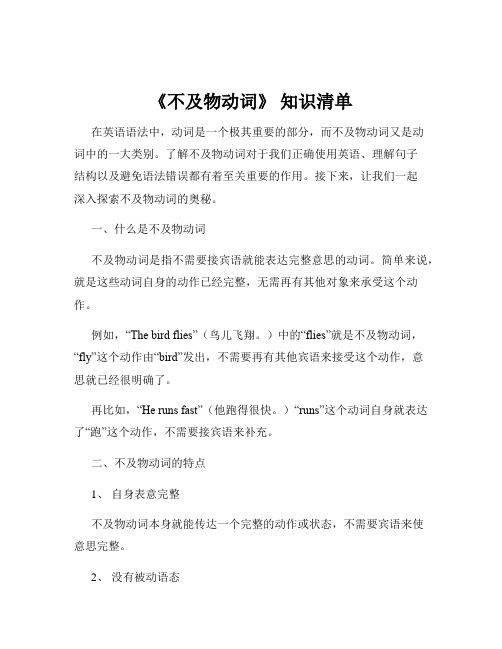
《不及物动词》知识清单在英语语法中,动词是一个极其重要的部分,而不及物动词又是动词中的一大类别。
了解不及物动词对于我们正确使用英语、理解句子结构以及避免语法错误都有着至关重要的作用。
接下来,让我们一起深入探索不及物动词的奥秘。
一、什么是不及物动词不及物动词是指不需要接宾语就能表达完整意思的动词。
简单来说,就是这些动词自身的动作已经完整,无需再有其他对象来承受这个动作。
例如,“The bird flies”(鸟儿飞翔。
)中的“flies”就是不及物动词,“fly”这个动作由“bird”发出,不需要再有其他宾语来接受这个动作,意思就已经很明确了。
再比如,“He runs fast”(他跑得很快。
)“runs”这个动词自身就表达了“跑”这个动作,不需要接宾语来补充。
二、不及物动词的特点1、自身表意完整不及物动词本身就能传达一个完整的动作或状态,不需要宾语来使意思完整。
2、没有被动语态由于不及物动词没有直接作用的对象,所以一般不存在被动形式。
比如,我们不能说“The news was arrived”,而要说“The news arrived”3、常与状语搭配为了更清楚地表达动作发生的情况,不及物动词常与状语连用。
状语可以是时间、地点、方式等。
比如,“She sings beautifully in the park every morning”(她每天早上在公园里唱得很动听。
)三、常见的不及物动词1、表示运动或位移的动词如“run”(跑)、“walk”(走)、“swim”(游泳)、“fly”(飞)、“jump”(跳)、“climb”(爬)等。
2、表示状态的动词像“sit”(坐)、“stand”(站)、“lie”(躺)、“sleep”(睡)等。
3、表示情感或心理状态的动词例如“laugh”(笑)、“cry”(哭)、“smile”(微笑)、“sigh”(叹气)等。
4、其他常见的不及物动词“happen”(发生)、“occur”(出现)、“arrive”(到达)、“depart”(离开)、“come”(来)、“go”(去)等。
不及物动词归纳

初中常有不及物动词1.不过不及物的:faint,hesitate,lie,occur,pause,rain,remain,sleep,sneeze.2.常有的及物,不及物的:answer,ask,begin,borrow,choose,climb,dance,eat,enter,fail,fill,grow,help, hurry,jump,know,leave,marry,meet,obey,pull,read,see,sell,touch,wash,w atch,win,write3.及物不及物意义变化的lift. 高升 beat vi.跳动 vt. 敲、打 ; grow vi.生长 vt. 栽种 play vi.嬉戏 vt. 打(牌、球) , 演奏 smell vi.发出(气味) vt. 嗅 ring vi.(电话、铃)响 vt.打电话 speak vi.发言 vt. 说(语言) hang vi. 悬挂 vt. 绞死 operate vi.着手术 vt. 操作4.意义不变的start, answer, sing, close, consider, insist, read, learn, prepare, pay, hurt, improve....5.常做不及物动词:live, go, work, listen, look, come, die, belong, fall, exist, rise, arrive, sit, sa il, hurry, fail, succeed. agree...不及物动词agree, go, work, listen, look, come, die, belong, fall, exist, rise, arrive, sit, sail, hurry, fail, succeed、 beat、 buy, catch, invent, found, like, observe, offer, prevent, promise, raise, find, forget,receive, regard, see, say, seat, supply, select, suppose, show, make, take, tell6.不及物动词短语1.break down (stop functioning 坏了,不好使了 )That old Jeep had a tendency to break down just when I needed it the most.2.catch on (become popular 有名 )Popular songs seem to catch on in California first and thenspread eastward.3. come back ( return to a place返回 )Father promised that we would never come back to this horrible place.4. come in ( Enter进入 )They tried to come in through the back door, but it was locked.e to ( regain consciousness恢复意识 )He was hit on the head very hard, but after several minutes, he startedto come to again.e over (to visit 接见 )The children promised to come over, but they never do.7.drop by (visit without appointment 趁便拜见 )We used to just drop by, but they were never home, so westopped doing that.8.eat out (dine in a restaurant 出门吃饭 )When we visited Paris, we loved eating out in the sidewalk cafes.9. get by ( survive将就,过得去 )Uncle Heine didn't have much money, but he always seemed to get by wi thout borrowing money from relatives.10.get up ( Arise起床 )Grandmother tried to get up, but the couch was too low, and shecouldn' t make it on her own.11. go back ( return to a place回到 )It's hard to imagine that we will ever go back to Lithuania.12.go on ( Continue持续 )He would finish one Dickens novel and then just go on to the next.13. go on (2) ( Happen发生 )The cops heard all the noise and stopped to see what was going on. 14. grow up ( get older变老 )Charles grew up to be a lot like his father.15.keep away ( remain at a distance保持距离 )The judge warned the stalker to keep away from his victim's home.16. keep on (+动名称 ) ( continue with the same 持续保持 )He tried to keep on singing long after his voice was ruined.17. pass out ( lose consciousness, faint昏过去,晕 )He had drunk too much; he passed out on the sidewalk outside the bar.18. show off ( demonstrate haughtily 夸耀 )Whenever he sat down at the piano, we knew he was going to show off.19. show up( Arrive抵达,出现 )Day after day, Efrain showed up for class twenty minutes late.20.wake up (arouse from sleep醒来 )I woke up when the rooster crowed.高中阶段的全部不及物动词(人教纲领版)depend expand disagreeoperate act paddleshrug dice sliceaccept owe aimdetermine skip diagnoseorganise advise reasonsip demonstrate advertiseadjust range flashdecrease admit advanceprosper fade diveaccumulate add partsow approve press apply mate strike drown applaud benefit recover entertain fire annoy poison rephrase govern stare bid adventure battle mine divide erupt behave pat rely fear speed arise prevent bargain mature struggle elect argue bite rejuvenate exist flee appeal pray reproduce kid steam broadcast apologise belong profit educate experiment bend perform remain fertilise spread associate raft bathe melt succeed embrace balance bleed relate fault floatrequire frown itchburst record rotreact tap conclude boil cheat shave fight identify cackle rank retire garden suffer claw respond calm remark tidy gather bow circulate research fry judge campaign refuel scream refer tear consult boom cheer skateboard flow insist camprap rise heat survive concentrate rhyme chat resign toast hesitate brake conquer resist function lackclap repeat seek register thrill cooperate bother choke starvecarve twist undertake howl contribute endeavour sail moulder weep touch swear compete consist differ leanleap volunteer shake stretch comment vary curse interrupt debate strengthen scare predict cast unite votehunt cooperate continue salute panic looptour tend share contract distinguish weigh match wander crack summarise communicate manage decline lead ship troop settle whisper combine unpack cycle import deal occur saw participate。
不及物动词句子成分分析
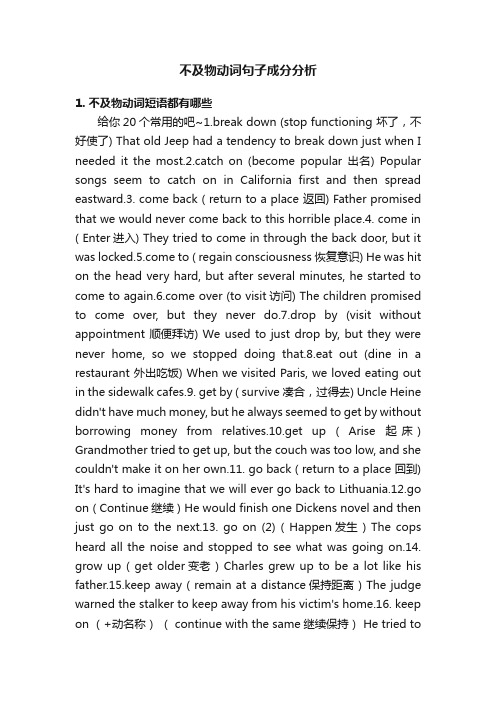
不及物动词句子成分分析1. 不及物动词短语都有哪些给你20个常用的吧~1.break down (stop functioning 坏了,不好使了) That old Jeep had a tendency to break down just when I needed it the most.2.catch on (become popular 出名) Popular songs seem to catch on in California first and then spread eastward.3. come back ( return to a place 返回) Father promised that we would never come back to this horrible place.4. come in ( Enter进入) They tried to come in through the back door, but it was e to ( regain consciousness恢复意识) He was hit on the head very hard, but after several minutes, he started to come to e over (to visit访问) The children promised to come over, but they never do.7.drop by (visit without appointment 顺便拜访) We used to just drop by, but they were never home, so we stopped doing that.8.eat out (dine in a restaurant 外出吃饭) When we visited Paris, we loved eating out in the sidewalk cafes.9. get by ( survive凑合,过得去) Uncle Heine didn't have much money, but he always seemed to get by without borrowing money from relatives.10.get up ( Arise起床) Grandmother tried to get up, but the couch was too low, and she couldn't make it on her own.11. go back ( return to a place 回到) It's hard to imagine that we will ever go back to Lithuania.12.go on ( Continue继续 ) He would finish one Dickens novel and then just go on to the next.13. go on (2) ( Happen发生) The cops heard all the noise and stopped to see what was going on.14. grow up ( get older变老 ) Charles grew up to be a lot like his father.15.keep away ( remain at a distance保持距离 ) The judge warned the stalker to keep away from his victim's home.16. keep on (+动名称)( continue with the same继续保持) He tried tokeep on singing long after his voice was ruined.17. pass out ( lose consciousness, faint昏过去,晕) He had drunk too much; he passed out on the sidewalk outside the bar.18. show off ( demonstrate haughtily 炫耀) Whenever he sat down at the piano, we knew he was going to show off.19. show up( Arrive到达,出现) Day after day, Efrain showed up for class twenty minutes late.20. wake up (arouse from sleep醒来) I woke up when the rooster crowed.。
动词的用法及各种搭配

动词的用法及各种搭配(总10页)--本页仅作为文档封面,使用时请直接删除即可----内页可以根据需求调整合适字体及大小--一、接不定式(而不接动名词)作宾语的24个常用动词afford to do sth. 负担得起做某事agree to do sth. 同意做某事arrange to do sth.安排做某事ask to do sth. 要求做某事beg to do sth. 请求做某事care to do sth. 想要做某事choose to do sth. 决定做某事decide to do sth. 决定做某事demand to do sth. 要求做某事determine to do sth. 决心做某事expect to do sth. 期待做某事fear to do sth. 害怕做某事help to do sth. 帮助做某事hope to do sth. 希望做某事learn to do sth. 学习做某事manage to do sth. 设法做某事offer to do sth. 主动提出做某事plan to do sth. 计划做某事prepare to do sth. 准备做某事pretend to do sth. 假装做某事promise to do sth. 答应做某事refuse to do sth. 拒绝做某事want to do sth. 想要做某事wish to do sth. 希望做某事注:有些不及物动词后习惯上也接不定式,不接动名词:aim to do sth. 打算做某事fail to do sth. 未能做某事long to do sth. 渴望做某事happen to do sth. 碰巧做某事hesitate to do sth. 犹豫做某事struggle to do sth. 努力做某事二、接不定式作宾补的36个常用动词advise sb. to do sth. 建议某人做某事allow sb. to do sth. 允许某人做某事ask sb. to do sth.请(叫)某人做某事bear sb. to do sth.忍受某人做某事beg sb. to do sth. 请求某人做某事cause sb. to do sth. 导致某人做某事command sb. to do sth. 命令某人做某事drive sb. to do sth .驱使某人做某事elect sb. to do sth. 选举某人做某事encourage sb. to do sth. 鼓励某人做某事expect sb. to do sth. 期望某人做某事forbid sb. to do sth. 禁止某人做某事force sb. to do sth. 强迫某人做某事get sb. to do sth. 使(要)某人做某事hate sb. to do sth. 讨厌某人做某事help sb. to do sth. 帮助某人做某事intend sb. to do sth. 打算要某人做某事invite sb. to do sth. 邀请某人做某事leave sb. to do sth. 留下某人做某事like sb. to do sth. 喜欢某人做某事mean sb. to do sth. 打算要某人做某事need sb. to do sth. 需要某人做某事oblige sb. to do sth. 迫使某人做某事order sb. to do sth. 命令某人做某事permit sb. to do sth. 允许某人做某事persuade sb. to do sth. 说服某人做某事prefer sb. to do sth. 宁愿某人做某事request sb. to do sth. 要求某人做某事remind sb. to do sth. 提醒某人做某事teach sb. to do sth .教某人做某事tell sb. to do sth. 告诉某人做某事train sb. to do sth. 训练某人做某事trouble sb. to do sth. 麻烦某人做某事want sb. to do sth. 想要某人做某事warn sb. to do sth. 警告某人做某事wish sb. to do sth. 希望某人做某事注:不要受汉语意思的影响而误用以下动词句型:汉语说:“害怕某人做某事”,但英语不说fear sb. to do sth.。
常见英语动词包括及物动词不及物动词的固定搭配
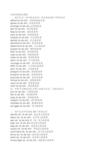
英语词组固定搭配一、接不定式(而不接动名词)作宾语的24个常用动词afford to do sth. 负担得起做某事agree to do sth. 同意做某事arrange to do sth.安排做某事ask to do sth. 要求做某事beg to do sth. 请求做某事care to do sth. 想要做某事choose to do sth. 决定做某事decide to do sth. 决定做某事demand to do sth. 要求做某事determine to do sth. 决心做某事expect to do sth. 期待做某事fear to do sth. 害怕做某事help to do sth. 帮助做某事hope to do sth. 希望做某事learn to do sth. 学习做某事manage to do sth. 设法做某事offer to do sth. 主动提出做某事plan to do sth. 计划做某事prepare to do sth. 准备做某事pretend to do sth. 假装做某事promise to do sth. 答应做某事refuse to do sth. 拒绝做某事want to do sth. 想要做某事wish to do sth. 希望做某事注:有些不及物动词后习惯上也接不定式,不接动名词:aim to do sth. 打算做某事fail to do sth. 未能做某事long to do sth. 渴望做某事happen to do sth. 碰巧做某事hesitate to do sth. 犹豫做某事struggle to do sth. 努力做某事二、接不定式作宾补的36个常用动词advise sb. to do sth. 建议某人做某事allow sb. to do sth. 允许某人做某事ask sb. to do sth.请(叫)某人做某事bear sb. to do sth.忍受某人做某事beg sb. to do sth. 请求某人做某事cause sb. to do sth. 导致某人做某事command sb. to do sth. 命令某人做某事drive sb. to do sth .驱使某人做某事elect sb. to do sth. 选举某人做某事encourage sb. to do sth. 鼓励某人做某事expect sb. to do sth. 期望某人做某事forbid sb. to do sth. 禁止某人做某事force sb. to do sth. 强迫某人做某事get sb. to do sth. 使(要)某人做某事hate sb. to do sth. 讨厌某人做某事help sb. to do sth. 帮助某人做某事intend sb. to do sth. 打算要某人做某事invite sb. to do sth. 邀请某人做某事leave sb. to do sth. 留下某人做某事like sb. to do sth. 喜欢某人做某事mean sb. to do sth. 打算要某人做某事need sb. to do sth. 需要某人做某事oblige sb. to do sth. 迫使某人做某事order sb. to do sth. 命令某人做某事permit sb. to do sth. 允许某人做某事persuade sb. to do sth. 说服某人做某事prefer sb. to do sth. 宁愿某人做某事request sb. to do sth. 要求某人做某事remind sb. to do sth. 提醒某人做某事teach sb. to do sth .教某人做某事tell sb. to do sth. 告诉某人做某事train sb. to do sth. 训练某人做某事trouble sb. to do sth. 麻烦某人做某事want sb. to do sth. 想要某人做某事warn sb. to do sth. 警告某人做某事wish sb. to do sth. 希望某人做某事注:不要受汉语意思的影响而误用以下动词句型:要表示以上意思,可换用其他表达:汉语的“原谅某人做某事”,英语可说成excuse [forgive] sb. for doing sth.。
- 1、下载文档前请自行甄别文档内容的完整性,平台不提供额外的编辑、内容补充、找答案等附加服务。
- 2、"仅部分预览"的文档,不可在线预览部分如存在完整性等问题,可反馈申请退款(可完整预览的文档不适用该条件!)。
- 3、如文档侵犯您的权益,请联系客服反馈,我们会尽快为您处理(人工客服工作时间:9:00-18:30)。
一、接不定式(而不接动名词)作宾语的24个常用动词afford to do sth. 负担得起做某事agree to do sth. 同意做某事arrange to do sth.安排做某事ask to do sth. 要求做某事beg to do sth. 请求做某事care to do sth. 想要做某事choose to do sth. 决定做某事decide to do sth. 决定做某事demand to do sth. 要求做某事determine to do sth. 决心做某事expect to do sth. 期待做某事fear to do sth. 害怕做某事help to do sth. 帮助做某事hope to do sth. 希望做某事learn to do sth. 学习做某事manage to do sth. 设法做某事offer to do sth. 主动提出做某事plan to do sth. 计划做某事prepare to do sth. 准备做某事pretend to do sth. 假装做某事promise to do sth. 答应做某事refuse to do sth. 拒绝做某事want to do sth. 想要做某事wish to do sth. 希望做某事注:有些不及物动词后习惯上也接不定式,不接动名词:aim to do sth. 打算做某事fail to do sth. 未能做某事long to do sth. 渴望做某事happen to do sth. 碰巧做某事hesitate to do sth. 犹豫做某事struggle to do sth. 努力做某事跟介词搭配的不及物动词count on 依靠embark on上路gamble on以……打赌insist on坚持……rely on依靠theorize on 对……推理,对……建立理论harp on 老提到……calculate on 指望,依靠concentrate on 集中到……depend on依靠reckon on盼望,指望……account for 说明,解释……answer for回答……apologize for为……道歉suffer for为……受苦pay for 为……付钱look for 寻找atone for补偿,赔偿make up for补偿stand for代表compensate for 补偿abstain from 有意回避,弃权desist from 停止refrain from抑制,忍住shrink from 回避suffer from 受苦,患病benefit from 获益于flinch from 退缩escape from 从……逃开approve of 同意boast of 吹牛consist of 由……组成despair of 失望dream of 梦想做某事repent of 忏悔,懊悔believe in 相信……persevere in 坚持……revel in 陶醉,着迷于……succeed in 在某方面成功delight in 为……高兴join in 加入……participate in 参加……persist in 坚持……specialize in 专门从事某事,在某方面专长aim at 瞄准于……chafe at 恼怒,不满frown at 向……皱眉头scowl at 沉下脸……,对……皱眉laugh at 嘲笑smile at向……微笑work at 从事于……,用功于……look at 看着……attend to 参加……certify to 证明……allude to 暗示……confess to 承认……descend to 下降到……object to 反对……react to 对某事作出反应refer to 提到……resort to 求助,采用……see to 检查……submit to 提交……testify to 表明,说明……turn to 转向……fall to 下跌,减弱及物动词与不及物动词:在英语中按动词后可否直接跟宾语,可以把动词分成两种:及物动词与不及物动词。
及物动词vt.及物动词:又称“他动词”。
又称“外动词”。
动词的一种。
它所表示的动作常涉及动作者以外的事物,如“吃”、“穿”、“读”、“写”等。
字典里词后标有vt. 的就是及物动词。
及物动词后必须跟有动作的对象(即宾语),并且可直接跟宾语。
如see 看见(vt.) +宾语I can see a boy.其实所谓“及物”,就是后面可直接加宾语的动词,有被动形式,而不及物动词是没有被动式的,也不可直接加宾语,需加上介词。
及物动词后面可直接接宾语,不及物动词后面不可直接接宾语,一般要加介词后再接宾语。
实际上很多动词既是及物动词,又是不及物动词。
举一个例子,就说write。
如I am writing.和I am writing a letter.在前一个句子write是不及物动词,在后一个句子write是及物动词。
又如,see是及物动词,但在特殊情况下如seeing is believing。
示例不及物动词就是一个动作不能施加到另一个物体上,也就是后面不能加宾语。
例如:He is running. run这个动词就是不及物动词,后面不能加sth。
(不能说跑什么东西)分清及物不及物动词:分清动词的及物不及物是在英语学习中必须解决的首要问题。
动词及物与不及物通常有以下几种情况:a.主要用作及物动词。
及物动词后面必须跟宾语。
可以用于:"主+谓+宾";"主+谓+双宾";"主+谓+宾+宾补"结构。
如:He reached Paris the day before yesterday.Please hand me the book over there.They asked me to go fishing with them.类似的还有:buy, catch, invent, found, like, observe, offer, prevent, promise, raise, find, forget, receive, regard, see, say, seat, supply, select, suppose, show, make, take, tell....b.主要用作不及物的动词。
不及物动词后面不跟宾语。
只能用于:"主+谓"结构。
This is the room where I once lived.类似的还有:agree, go, work, listen, look, come, die, belong, fall, exist, rise, arrive, sit, sail, hurry, fail, succeed....c.既可以用作及物又可以用作不及物的动词,其意义不变。
如begin 都是作"开始"讲。
everybody , our game begins. let us begin our game. 类似的还有:start, answer, sing, close, consider, insist, read, learn, prepare, pay, hurt, improve....d.既可以用作及物又可以用作不及物的动词,其意义完全不同。
这类动词作不及物动词是一个意义;而作及物动词时却是另一个意义。
如lift作不及物动词时是指烟雾的"消散"。
we saw the mountain when the clouds lifted. 作及物动词时是"升高;举起"。
He lifted his glass and drank.类似的还有:beat vi.跳动vt. 敲、打;grow vi.生长vt.种植play vi.玩耍vt. 打(牌、球),演奏smell vi.发出(气味)vt. 嗅ring vi.(电话、铃)响vt.打电话speak vi.讲话vt. 说(语言)hang vi. 悬挂vt.绞死operate vi.动手术vt. 操作在英语错误中,“及物动词+介词+宾语”(transitive verb+preposition+object),是常见的一种。
所谓及物动词,就是谓语动词(predicative verb),不必通过介词引荐宾语。
相反的,不及物动词(intransitive verb)是不带宾语的。
有许多动词,虽然性质是及物的,但不一定要有宾语,如下列的①a和②a便是这种情形:①a. We study every day.①a. We study every day.b. Do you study English every day.②a. Please write clearly next time.b. Can you write your composition now?如果本质上就是不及物动词,就不会有宾语;若要宾语,就要借介词之助,一起连用才行(不及物动词+宾语+介词),如③b和④b;③a和④a是错的;*③a. The children are listening the music.b. The children are listening to the music.*④a. She is laughing the crippled man.b. She is laughing at the crippled man.反之,及物动词不必靠介词,就可以带宾语,如上述的①b和②b ,又如⑤和⑥:⑤John is giving a book to me.⑥Who will answer this question?如果无意中把介词加上,就错了,如:*⑦Who will answer to this question?下列这句从房地产广告中看到的句子,也犯了同样的错:“We have many buyers awaiting for available units here.”“Awaiting”是个及物动词,后面的介词“for”是多余的,要去掉;不然把“awaiting”改为“waiting for”也行。
许多人习惯上喜欢把介词加到及物动词后面,然后才带出宾语。
最常见的是“emphasize/stress on/upon”和“discuss about”,如:⑧Singaporeans seem to have emphasized on material gains.⑨In our education system, we stress upon examination results.⑩World leaders spent a lot of time discussing about worsening economic problems.显然的,这三句里的介词“on/upon”和“about”是多余的,不必要的。
